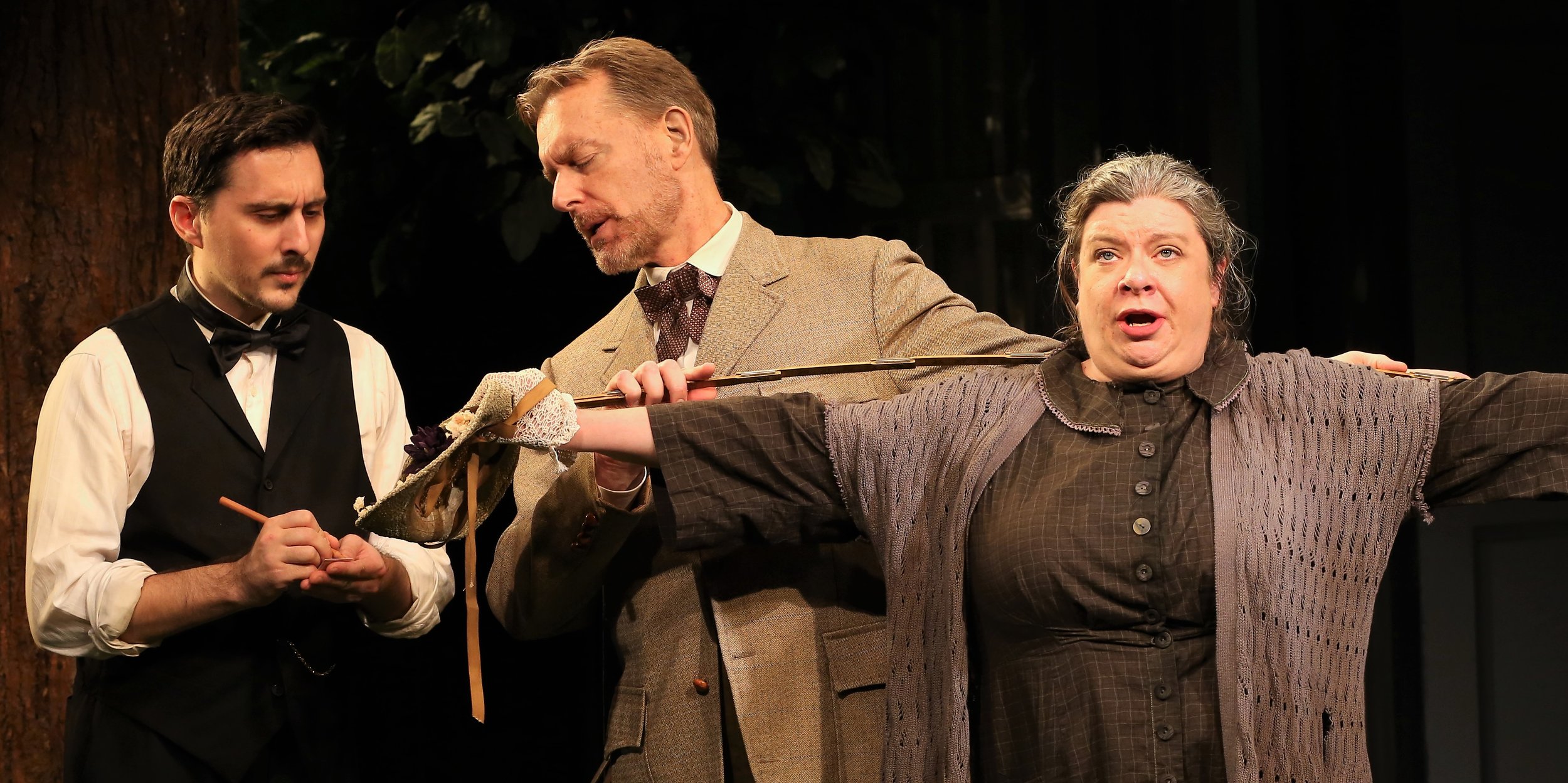The “home place” in the title of Irish playwright Brian Friel's 2005 drama is Kent, England, where the family of widowed landowner Christopher Gore (John Windsor-Cunningham) originated. Gore, residing in Ballybeg, Ireland, speaks of Kent as a paradise lost, though he’s never really lived there. He and his son David (Ed Malone) administer their Irish estates with an uneasy liberality toward their tenants, made all the more uneasy by the recent murder of another local English landlord.
Ballybeg is the backdrop for several of Friel’s works. Like William Faulkner’s fictional Yoknapatawpha County, Mississippi, or Stephen King’s Derry, Maine, Ballybeg is both a finely camouflaged reconstruction of its author’s native territory and a chance to imagine different possibilities for it. It’s home and not home. As such, it’s also the perfect setting for Friel’s The Home Place, receiving its New York premiere at Irish Repertory Theatre.
Rachel Pickup (left) is the upwardly mobile Margaret, and Ed Malone is her aspiring suitor David, in Brian Friel's The Home Place. Top: Pickup with John Windsor-Cunningham as Christopher Gore.
The time is 1878, and the national unrest that will eventually become the Home Rule independence movement is just beginning to boil over, but the Gores have been spared so far by running their estate more or less magnanimously. Both men are in love with Margaret (Rachel Pickup), the local woman in charge of their household, but are casually cruel to Sally (Andrea Lynn Green), their Irish maid.
The tenuous peace is threatened by the arrival of Gore’s cousin, Richard (Christopher Randolph), an anthropologist documenting “negrescence,” or blackness, throughout the British Isles with his supercilious research assistant, Perkins (Stephen Pilkington). Richard subscribes to popular pseudoscientific notions of the 1800s which held that physical and moral superiority of certain races not only went hand in hand but were scientifically provable. Not all of Ballybeg’s working-class residents agree: foremost among them are Con Doherty (Johnny Hopkins), Sally’s secret paramour, and his brutish friend/henchman Johnny (Gordon Tashjian).
The play treads a precarious line between expressionist evocations of home (differently conceived by each character) and realistic melodrama. James Noone’s set amplifies this tension, a skeletal corner of the Gores’ large home intruding on County Donegal’s lush greenery at oblique, violent angles.
The large cast (at least it feels large on Irish Rep’s cramped stage), conservatively directed by Rep cofounder Charlotte Moore, avails itself to rather more mixed results. Green’s playful Sally, and Robert Langdon Lloyd, in his one scene as O’Donnell, Margaret’s alcoholic father, are the standouts. Rachel Pickup’s Margaret is the play’s heart, desperate to rise above her Irishness but unable to shake it, at once local success story and traitor to her community. Pickup was a suitably haughty Portia in Shakespeare’s Globe’s recent Merchant of Venice, and that icy quality suits her Irish striver well, but Pickup can only do so much with an underwritten character, as indeed almost all the characters are. Additionally, each actor’s performance is pitched on its own wavelength, creating enervating emotional chaos instead of kinetic actorly fizz.
From left: Stephen Pilkington as Perkins, Christopher Randolph as Dr. Richard Gore, and Polly McKie as Mary. Photos by Carol Rosegg.
That’s a shame. Though the play can’t touch Friel’s best work, it is a subtle, rich examination of a changing Ireland, recovering from the deprivations of the potato famine and bracing itself to throw off its British shackles. The first scene of Act II, when Richard (who declares himself, without irony, “a slave to shortbread”) and Perkins measure the locals with a clinically dehumanizing detachment, is a tense and emotionally unsparing dramatic construction that directly connects the events of the play to the inhuman legacy of colonialism and racism. For Richard, cracking the genetic code is the key to expanding the empire and allowing England to rule the entire world. “I am a scientist, not a nanny,” he replies haughtily when Gore expresses misgivings about his inhumane treatment of his test subjects. If Richard and his assistant are rendered as mustache-twirling cartoon villains, the portrayal is not entirely unearned.
When Con threatens violence if the scientists don’t leave immediately, Gore sends his cousin away. Though clearly the correct choice, it also portends the end of his velvet-fisted grip on the community. The play’s rushed finale attempts to conflate the botched love triangle of Gore, David and Margaret with their willful ignorance of the currents of change and the moral failings of their liberalism. It’s staged so quickly and confusedly, though, that the bottom falls right out of the play, and the horror of earlier scenes dissipates into bathos. The production’s emotions are as imaginary as its setting and as homeless as its characters.
Brian Friel’s The Home Place runs through Dec. 17 at Irish Repertory Theatre (132 W. 22nd St.). Evening performances are at 8 p.m. on Wednesday, Friday, and Saturday, and 7 p.m. on Thursday; matinees are at 3 p.m. Wednesday, Saturday, and Sunday. For tickets and information, call (212) 727-2737 or visit irishrep.org.





